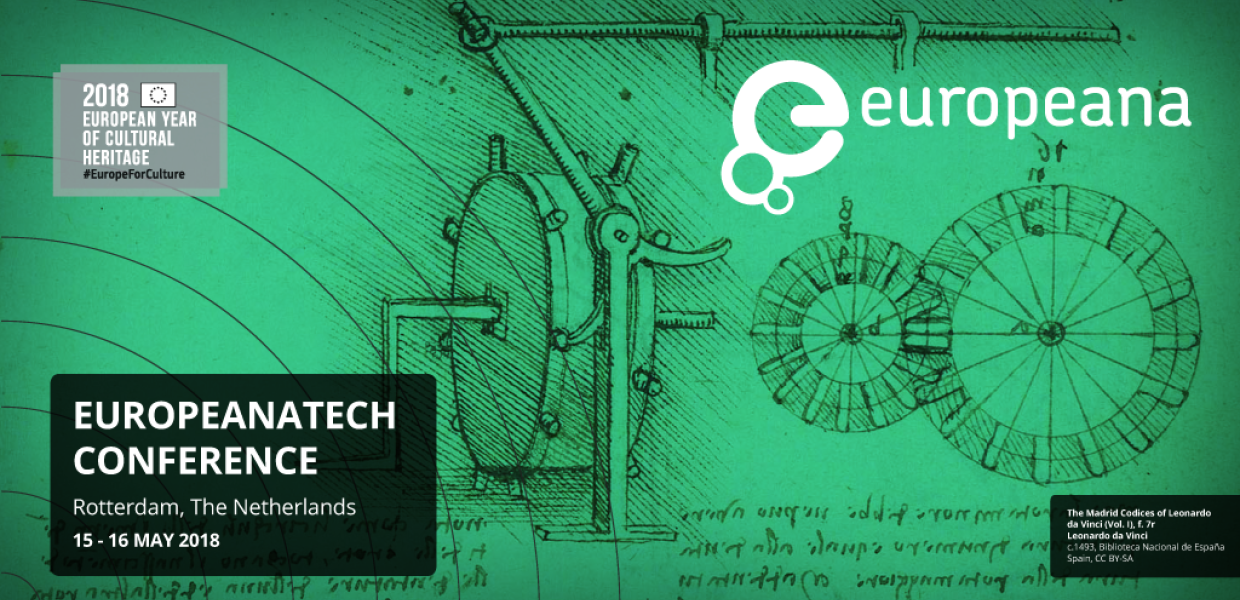EuropeanaTech 2018 - first speakers announced
On 15-16 May, the third international EuropeanaTech conference will take place on the ss Rotterdam, in Rotterdam, the Netherlands. EuropeanaTech 2018 places tech firmly at the centre of the European Year of Cultural Heritage, and we are delighted to announce the first wave of conference details and programme.

- Title:
- The Madrid Codices of Leonardo Da Vinci (Vol. I), f. 7r
- Creator:
- Leonardo Da Vinci
- Date:
- c.1493
- Institution:
- Biblioteca Nacional de España
- Country:
- Spain
- Copyright:
- CC BY-SA
Gorgeous data, glorious technology - the digital face of culture
EuropeanaTech 2018 brings together an international network of technical and R&D specialists from cultural heritage organisations, research institutions and creative industries to share innovative development and predict the technical future of digital cultural heritage. The conference will focus on the three Ds; Data, Discovery and Delivery, spanning topics as diverse as:
-
Centralised vs decentralised delivery
-
Artificial recognition and intelligence
-
Browse interfaces
-
Structured commons
-
Wikidata
Ingrid Mason will be our master of ceremonies. A deployment strategist, echnologist, librarian and data specialist, Ingrid is a linked open data expert and leader in change associated with digital transformation.
Our confirmed keynote speakers
We have four keynote speakers confirmed, with more to come. First up is Ben Vershbow. Ben is a digital innovator with more than a decade of experience at the intersection of libraries, publishing, arts and the web. Ben leads Wikimedia's Community Programs team and has long advocated for deeper collaboration between GLAMs, academia and the Wikimedia movement.
Robert Sanderson is a world-renowned information scientist and expert in linked open data and the digitisation of cultural heritage. He is the Getty’s first semantic architect and is a passionate advocate for open culture. His conference call will be - to be successful in the missions of our organisations, we must take up the banner of usable data and 'Shout It Out: LOUD'.
George Oates is the director of Good Form and Spectacle, CEO and founder of Museum in a Box, and inventor of The Commons on Flickr. George has an extensive CV of leading innovation in the cultural heritage sector. An experienced speaker about design, community and control, she will present ‘Every collection is a snowflake’.
Ruben Verborgh is a professor of Semantic Web technology at IDLab and a postdoctoral fellow of the Research Foundation, Flanders. With expertise in decentralisation, hypermedia clients, Web APIs and Linked Data, Ruben is currently collaborating with Tim Berners-Lee on re-decentralising the web. Under the title 'One flew over the cuckoo’s nest', he will address the role of aggregation on a decentralised web.
The three Ds: Data
Without data we have nothing. But sometimes the data we do have leaves much to be desired. Finding automatic ways to enrich it and improve its discoverability is the basis of making our cultural heritage work in the digital world.
We'll be joined by a number of data experts to give presentations and lead discussion:
-
Sandra Fauconnier, GLAM-Wiki strategist on Structured Data on 'Wikimedia Commons - Structuring and linking the world's heritage (and more!)'
-
Jason Evans, National Library of Wales, just one of a handful of Wikimedians employed by a library worldwide with 'Wikidata in GLAMs. How and why'
-
Emmanuelle Bermes, Deputy Director for Services and Networks at the National Library of France will host a vocabularies panel on ‘Wikidata as authority data’.
The three Ds: Discovery
The art of any digital strategy for a cultural heritage organisation is to increase the discoverability and use of its material. Discovery spans indexing by the search engines to getting people past the shop window.
Confirmed for EuropeanaTech so far are:
-
Herbert Van De Sompel, Information Scientist at Los Alamos National Laboratory and Open Archives Initiative legend, will use insights gained from discussing link vulnerability for the document web to explore the problem domain for Linked Data collections in his presentation 'The Weak Link'. Herbert will end the first day with this talk as a 'Future Note'.
-
Tristan Roddis, Head of Web Development at Cogapp will be presenting on what computers see when they look at art and ’When automated analysis goes wrong'
The three Ds: Delivery
So you’ve got good data, and worked on your UX design but how are you going to manage and deliver a service to your audience? How performant does your platform need to be? Are you API-centric?
We’ll hear from:
-
Laurie Arp on her co-directed project ‘It Takes a Village: Open Source Software Models of Collaboration and Sustainability’
-
Nora Al-Badri and Jan Nikolai Nelles, the artists who ‘acquired’ the 3D-Scan of Nefertiti’s Bust.
-
Plaban Bhowmick, Assistant Professor at the Indian Institute of Technology with a new take on aggregation.
-
Chris Arwe, Head of Information Services at the University of Hull with 'From Hydra to Samvera: evolution of an open source repository community'
-
Our very own Valentine Charles who will talk the conference through the Europeana data aggregation product in development – Metis.
Register now
To see the latest EuropeanaTech 2018 programme visit our event page where you can find out more and book your tickets.
We’ll be announcing more conference details over the coming weeks, stay tuned for these.

